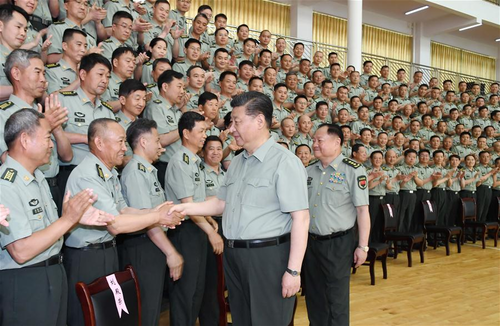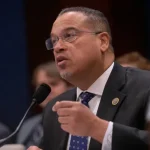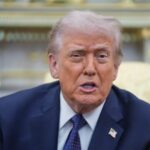
A fascinating new report in Nikkei Asia has unearthed and detailed the findings of an elite Chinese state-linked think tank which reports directly to the People's Liberation Army. Nikkei in the context of examining the timing and motives behind China's 12-point peace plan said that Chinese military experts are predicting the Russia-Ukraine war will end this summer.
To review, the 12-point plan urged implementation of a ceasefire and the resumption of negotiations toward a permanent peaceful settlement, and was unveiled on the one-year Feb.24 anniversary of the war. But the Nikkei report asserts there's specific rationale driving Beijing: "The reason for China's sudden change can be traced back to a report issued two months earlier by a top think tank in Beijing."
"The Academy of Military Sciences [AMS] reports directly to the People's Liberation Army," Nikkei continues. "Although it cannot be found on a map, the institution is located in Beijing's Haidian district, which itself is home to the ruins of Yuanmingyuan, a palace destroyed by Western armies in the 19th century."

The report goes on the detail how central and important the AMS is as a military think tank (a kind of 'Chinese Rand Corporation' in terms of influence), issuing recommendations directly to the Communist Party's Central Military Commission, which is the PLA's top decision-making body.
And here's where the Nikkei report gets most interesting...
In December, the AMS completed a simulation on the Ukraine conflict, resulting in an astonishing finding, according to sources close to the Chinese government. The war will draw to a close around summer 2023, the simulation indicated, with Russia having the upper hand.
Both the Russian and Ukrainian economies would be too exhausted to sustain the war past the summer, the report said.
It is possible that the results were skewed in favor of Russia to please China's Moscow-leaning leadership. But coincidentally, the $45 billion aid package passed last December in the U.S. is set to expire this summer too.
It should also be noted that Republican leadership in the GOP-dominated House has vowed to reign in the "blank check" approach to Ukraine, also amid even the Biden administration recently giving signals that the aid won't last forever. But, the consensus among Pentagon leadership has been that the Ukraine war could drag on for years.
Nikkei says that the think tank simulation led to the peace proposal gaining momentum in the halls of power in Beijing. "After hearing the AMS' prediction, Beijing crafted a peace proposal in time for the one-year anniversary of the war," the report reads. "It aims to achieve three goals, including the restoration of relations with Europe." These can be briefly summarized as follows:
- improved and closer Chinese political and economic relations with Europe
- preservation of friendly relations with Ukraine
- China emerging as the prime peacemaker between Moscow and Kiev
Should President Xi Jinping accept Putin's recent invitation to travel to Moscow, all of these things will be in play in what will be a highly watched visit, with Western governments closely scrutinizing every word to come out of it.
Some pundits have seen a major power like China getting involved in dialogue as crucial to kicking off real momentum...
The gruesome war continues unabated with huge numbers of young Ukrainian and Russian men dead. Yet, no calls for peace negotiations from our leaders! Only China has put forward a proposal for starting negotiations, which the US and EU immediately shot downhttps://t.co/LtImXuOXoD
— Glenn Diesen (@Glenn_Diesen) March 10, 2023
Even though Washington quickly rejected that Beijing is honest player when it comes to peace, the most surprising reaction came from Kiev itself, it should be recalled:
Volodymyr Zelenskiy has cautiously welcomed China’s peace plan to end Russia’s invasion of Ukraine but said it would be acceptable only if it led to Vladimir Putin pulling his troops out from all occupied Ukrainian territory.
Speaking at a press conference in Kyiv to mark the first anniversary of Moscow’s full-scale attack, the Ukrainian president said he "wanted to believe" Beijing was interested in a "fair peace". That meant not "supplying weapons to Russia", he said, adding: "I’m doing my best to prevent that from happening. This is priority number one."
Moscow, as well as a few analysts in the West, have accused the United States and United Kingdom of seeking to sabotage peace. This is why the US and UK will likely remain cold regarding any Chinese efforts at a serious and lasting peace.
And Nikkei too comments, "If China fails at becoming a peacemaker, the ramifications would undermine Xi's authority and prestige. It remains to be seen if the current leadership filled with Xi loyalists will be capable of a feat that requires complex negotiating skills and tenacious fortitude." Again, this is all the more reason for Washington hawks to want to quash Beijing's efforts before they even get off the ground. But another prime question will be is how much sway will Xi hold with Putin when it comes to Ukraine?
A fascinating new report in Nikkei Asia has unearthed and detailed the findings of an elite Chinese state-linked think tank which reports directly to the People’s Liberation Army. Nikkei in the context of examining the timing and motives behind China’s 12-point peace plan said that Chinese military experts are predicting the Russia-Ukraine war will end this summer.
To review, the 12-point plan urged implementation of a ceasefire and the resumption of negotiations toward a permanent peaceful settlement, and was unveiled on the one-year Feb.24 anniversary of the war. But the Nikkei report asserts there’s specific rationale driving Beijing: “The reason for China’s sudden change can be traced back to a report issued two months earlier by a top think tank in Beijing.”
“The Academy of Military Sciences [AMS] reports directly to the People’s Liberation Army,” Nikkei continues. “Although it cannot be found on a map, the institution is located in Beijing’s Haidian district, which itself is home to the ruins of Yuanmingyuan, a palace destroyed by Western armies in the 19th century.”

The report goes on the detail how central and important the AMS is as a military think tank (a kind of ‘Chinese Rand Corporation’ in terms of influence), issuing recommendations directly to the Communist Party’s Central Military Commission, which is the PLA’s top decision-making body.
And here’s where the Nikkei report gets most interesting…
In December, the AMS completed a simulation on the Ukraine conflict, resulting in an astonishing finding, according to sources close to the Chinese government. The war will draw to a close around summer 2023, the simulation indicated, with Russia having the upper hand.
Both the Russian and Ukrainian economies would be too exhausted to sustain the war past the summer, the report said.
It is possible that the results were skewed in favor of Russia to please China’s Moscow-leaning leadership. But coincidentally, the $45 billion aid package passed last December in the U.S. is set to expire this summer too.
It should also be noted that Republican leadership in the GOP-dominated House has vowed to reign in the “blank check” approach to Ukraine, also amid even the Biden administration recently giving signals that the aid won’t last forever. But, the consensus among Pentagon leadership has been that the Ukraine war could drag on for years.
Nikkei says that the think tank simulation led to the peace proposal gaining momentum in the halls of power in Beijing. “After hearing the AMS’ prediction, Beijing crafted a peace proposal in time for the one-year anniversary of the war,” the report reads. “It aims to achieve three goals, including the restoration of relations with Europe.” These can be briefly summarized as follows:
- improved and closer Chinese political and economic relations with Europe
- preservation of friendly relations with Ukraine
- China emerging as the prime peacemaker between Moscow and Kiev
Should President Xi Jinping accept Putin’s recent invitation to travel to Moscow, all of these things will be in play in what will be a highly watched visit, with Western governments closely scrutinizing every word to come out of it.
Some pundits have seen a major power like China getting involved in dialogue as crucial to kicking off real momentum…
The gruesome war continues unabated with huge numbers of young Ukrainian and Russian men dead. Yet, no calls for peace negotiations from our leaders! Only China has put forward a proposal for starting negotiations, which the US and EU immediately shot downhttps://t.co/LtImXuOXoD
— Glenn Diesen (@Glenn_Diesen) March 10, 2023
Even though Washington quickly rejected that Beijing is honest player when it comes to peace, the most surprising reaction came from Kiev itself, it should be recalled:
Volodymyr Zelenskiy has cautiously welcomed China’s peace plan to end Russia’s invasion of Ukraine but said it would be acceptable only if it led to Vladimir Putin pulling his troops out from all occupied Ukrainian territory.
Speaking at a press conference in Kyiv to mark the first anniversary of Moscow’s full-scale attack, the Ukrainian president said he “wanted to believe” Beijing was interested in a “fair peace”. That meant not “supplying weapons to Russia”, he said, adding: “I’m doing my best to prevent that from happening. This is priority number one.”
Moscow, as well as a few analysts in the West, have accused the United States and United Kingdom of seeking to sabotage peace. This is why the US and UK will likely remain cold regarding any Chinese efforts at a serious and lasting peace.
And Nikkei too comments, “If China fails at becoming a peacemaker, the ramifications would undermine Xi’s authority and prestige. It remains to be seen if the current leadership filled with Xi loyalists will be capable of a feat that requires complex negotiating skills and tenacious fortitude.” Again, this is all the more reason for Washington hawks to want to quash Beijing’s efforts before they even get off the ground. But another prime question will be is how much sway will Xi hold with Putin when it comes to Ukraine?
Loading…






